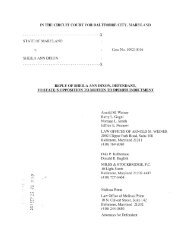Motion in Limine to Exclude Evidence of Other Acts - Dixon
Motion in Limine to Exclude Evidence of Other Acts - Dixon
Motion in Limine to Exclude Evidence of Other Acts - Dixon
Create successful ePaper yourself
Turn your PDF publications into a flip-book with our unique Google optimized e-Paper software.
forms, is not relevant <strong>to</strong> the crimes charged <strong>in</strong> this case and is not permitted pursuant <strong>to</strong><br />
Marland Rule 5-404(b). i<br />
II. ARGUMENT<br />
A. Legal Standard for Admission <strong>of</strong> <strong>Evidence</strong> <strong>of</strong> <strong>Other</strong> Crimes or Bad <strong>Acts</strong><br />
It is black letter law that evidence <strong>of</strong> a Defendant's prior crim<strong>in</strong>al acts may not be<br />
<strong>in</strong>troduced <strong>to</strong> prove her guilt <strong>of</strong> the <strong>of</strong>fense for which she is on triaL. See Straughn v.<br />
State, 297 Md. 329, 333, 465 A.2d 1166 (1983); State v. Faulkner, 314 Md. 630, 633,<br />
552 A.2d 896 (1989). A Defendant's Sixth Amendment right <strong>to</strong> a fair trial generally<br />
compels the exclusion <strong>of</strong> evidence <strong>of</strong> other bad acts by the Defendant. See Merzbacher v.<br />
State, 346 Md. 391,407,697 A.2d 432 (1997).<br />
Consistent with these pr<strong>in</strong>ciples, Maryland Rule 5-404(b) dictates that "( e )vidence<br />
<strong>of</strong> other crimes, wrongs, or acts is not admissible <strong>to</strong> prove the character <strong>of</strong> a person <strong>in</strong><br />
order <strong>to</strong> show action <strong>in</strong> conformity therewith." As the Court <strong>of</strong> Appeals expla<strong>in</strong>ed <strong>in</strong><br />
Straughn:<br />
There are two reasons for the rule (exclud<strong>in</strong>g evidence <strong>of</strong> prior bad acts).<br />
First, if a jury considers a Defendant's prior crim<strong>in</strong>al activity, it may<br />
decide <strong>to</strong> convict and punish him for hav<strong>in</strong>g a crim<strong>in</strong>al disposition.<br />
Second, a jury might <strong>in</strong>fer that because the Defendant has committed<br />
crimes <strong>in</strong> the past, he is more likely <strong>to</strong> have committed the crime for<br />
which he is be<strong>in</strong>g tried.<br />
Straughn, 297 Md. at 333, 465 A.2d 1166. The Court <strong>of</strong> Appeals has stated that "there<br />
are few pr<strong>in</strong>ciples <strong>of</strong> American crim<strong>in</strong>al jurisprudence more universally accepted than the<br />
rule that evidence which tends <strong>to</strong> show that the accused committed another crime<br />
i Obviously, Defendant is not suggest<strong>in</strong>g that evidence related <strong>to</strong> gifts given <strong>to</strong> Defendant by Mr. Lipscomb<br />
is <strong>in</strong>admissible, as that evidence may demonstrate that the gift cards were not s<strong>to</strong>len from Lipscomb as<br />
alleged <strong>in</strong> the Theft <strong>in</strong>dictment. The dist<strong>in</strong>ct issue <strong>of</strong> evidence relat<strong>in</strong>g <strong>to</strong> the alleged peijury, i.e., the<br />
failure <strong>to</strong> disclose the gifts on the f<strong>in</strong>ancial disclosure forms, is the evidence that is <strong>in</strong>admissible pursuant <strong>to</strong><br />
Rule 5-404(b), not the evidence that gifts were given <strong>to</strong> Defendant.<br />
3

















